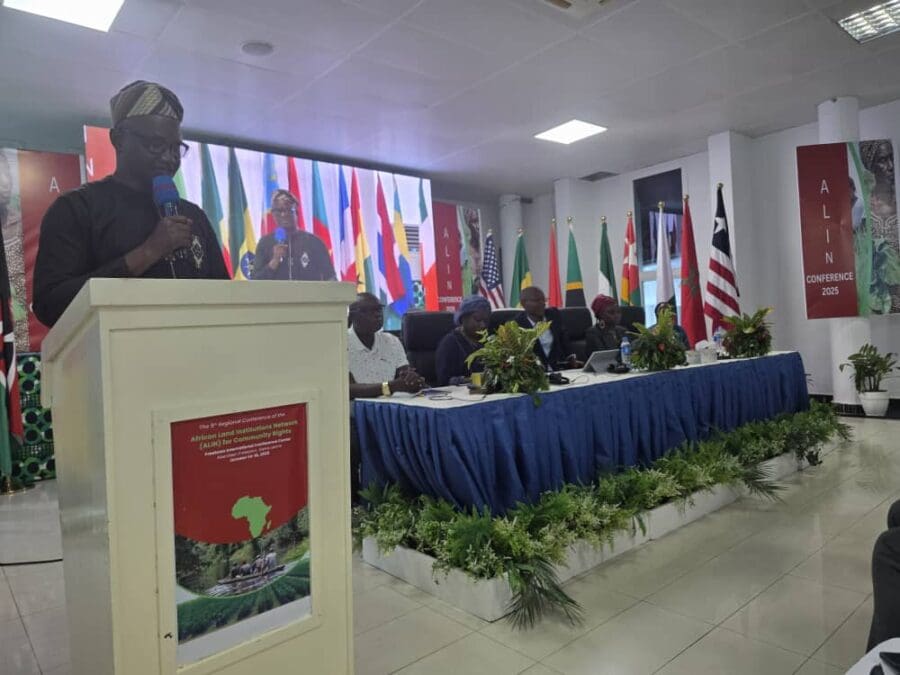Africa Land Institutions Network for Community Rights (ALIN)
READ THE DECLARATIONThe Fifth Regional Conference of the Africa Land Institutions Network for Community Rights (ALIN) will take place October 14–16, 2025, in Freetown, Sierra Leone, under the theme “Securing Community Land Rights in Africa.”
Co-hosted by Rights and Resources Initiative, the Government of Sierra Leone, and the Sierra Leone Land Alliance (SLLA), the 2025 edition will bring together government representatives, civil society organizations, Indigenous and community leaders, and regional institutions from across Africa.
Building on the progress made in previous editions held in Ghana (2017), Madagascar (2019), Togo (2021), and Tanzania (2023), the 2025 conference will assess the implementation of national action plans, share lessons learned, and chart a new collective roadmap for advancing community and customary land rights across the continent.

Why This Conference Matters
Across Africa, national governments and regional institutions are advancing bold land and forest tenure reforms to secure the rights of Indigenous Peoples and local communities. Yet challenges persist: from limited institutional capacity and underfunding to the slow implementation of policies and laws.
The 2025 conference will:
- Evaluate progress made since the 2023 Arusha Conference;
- Strengthen collaboration among national land institutions, civil society, and regional economic communities;
- Highlight innovations in land and forest governance that promote equity, gender inclusion, and climate resilience; and
- Reaffirm commitments to secure community land rights as a foundation for peace, sustainable development, and biodiversity conservation.
Check out daily summaries and photos from the event below!
Day 1: Setting the Stage for Transformative Land Governance in Africa
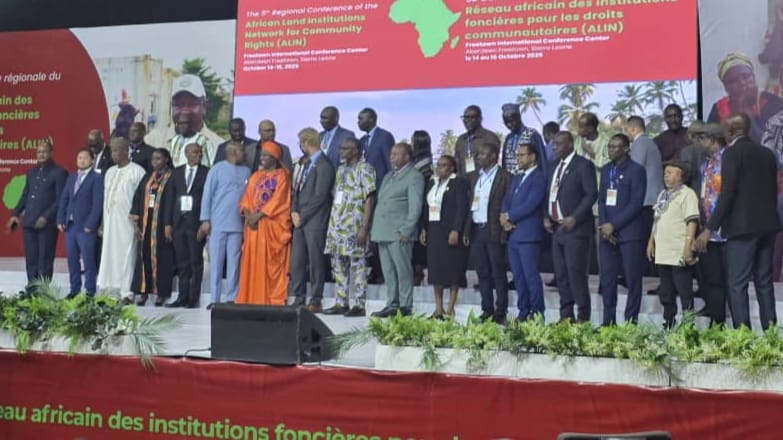
Opening Reflections: A Call for Balance, Justice, and Inclusion
In his opening address, Dr. Turad Senesie, Minister of Land, Housing, and Country Planning of Sierra Leone, emphasized the urgency of protecting community land rights:
“The protection of community land rights is timely and urgent. Across the continent, communities, especially Indigenous Peoples, are calling for stronger recognition and protection of their land rights. Our shared commitment must be to ensure that land reforms benefit our people, our states, and our investors, in a balanced and just manner.”
Solange Bandiaky-Badji, President and Coordinator of RRI, called on African nations to lead a continental transformation toward secure land and resource rights:
“African nations can and must lead the transformation toward secure land and resource rights for Indigenous Peoples and local communities. Our role is to ensure that experiences from these communities inform national and international policies.”
Representing traditional authorities, Paramount Chief David of the National Council of Paramount Chiefs highlighted the importance of integrating traditional and modern systems of land governance:
“Together, we can safely merge traditional land governance systems with modern technical approaches for the lasting benefit of our people and our continent.”
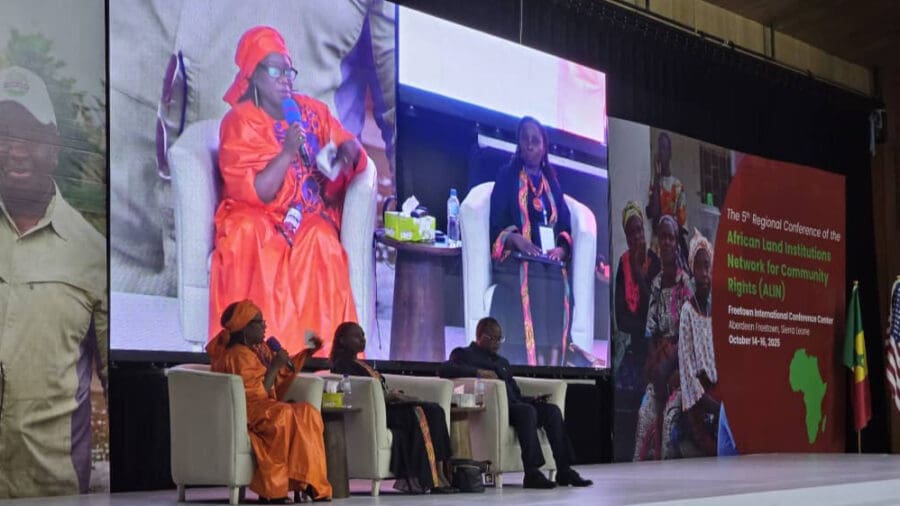
Women at the Center of Land Governance
Gender equity emerged as a key theme on Day 1. Mariama Jusu Koiya, from the UN Women Head Office of Sierra Leone, underscored the need for inclusive and culturally sensitive engagement:
“To strengthen community land ownership and rights, it is essential to adopt best practices that promote inclusive governance and culturally sensitive engagement, ensuring that women’s voices are central in all land-related decisions.”
She also reminded participants of the persistent gender gap in land ownership:
“Land is not only an economic asset, it is power, security, and dignity. Yet across Africa, women who produce up to 70% of food own less than 15% of the land they cultivate.”
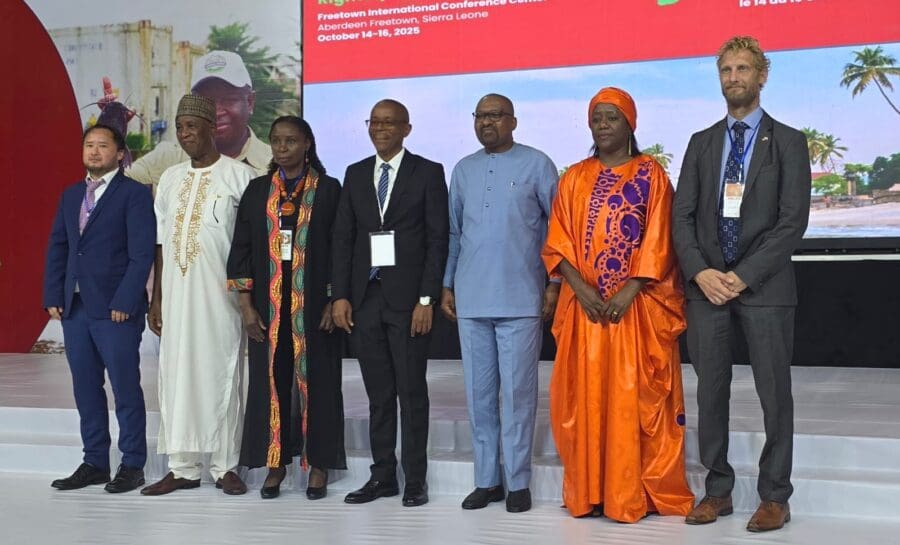
Day 2: Advancing Tools and Partnerships to Secure Community Land Rights
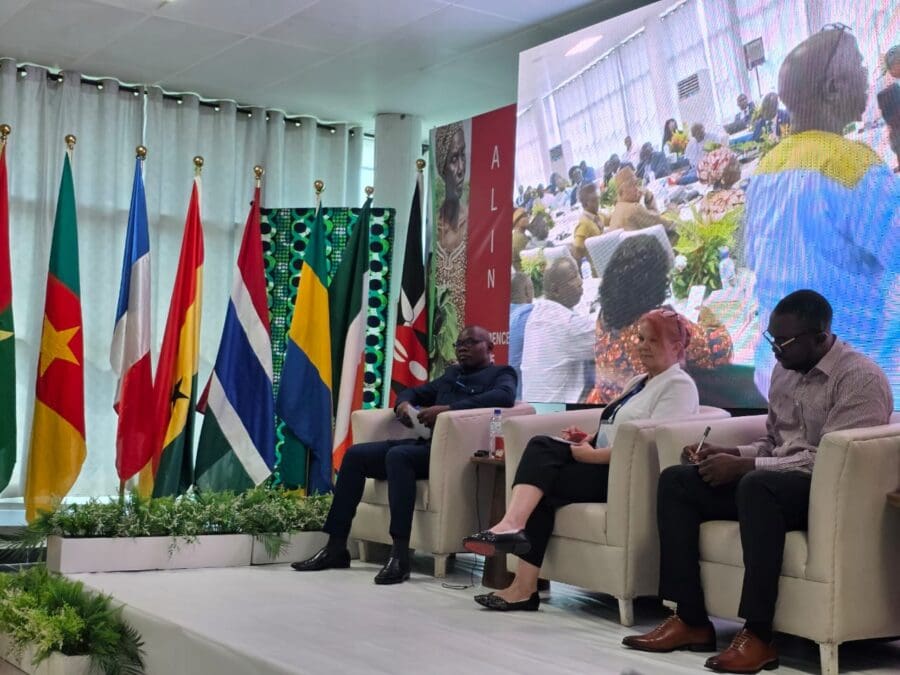
Sharing Experiences and Innovative Approaches
The second day of the Conference was dedicated to interactive panel discussions and presentations of country reports. Participants exchanged experiences and lessons on tools and approaches supporting land governance processes, including the fit-for-purpose approach and the use of AI-driven digital transformation—from the registration of instruments to land title registration in several countries.
Delegates reflected on the progress achieved since the last ALIN Conference held in Arusha in 2023, highlighting advances such as the issuance of land titles and certificates, and the establishment of local land authorities and institutions in different countries.
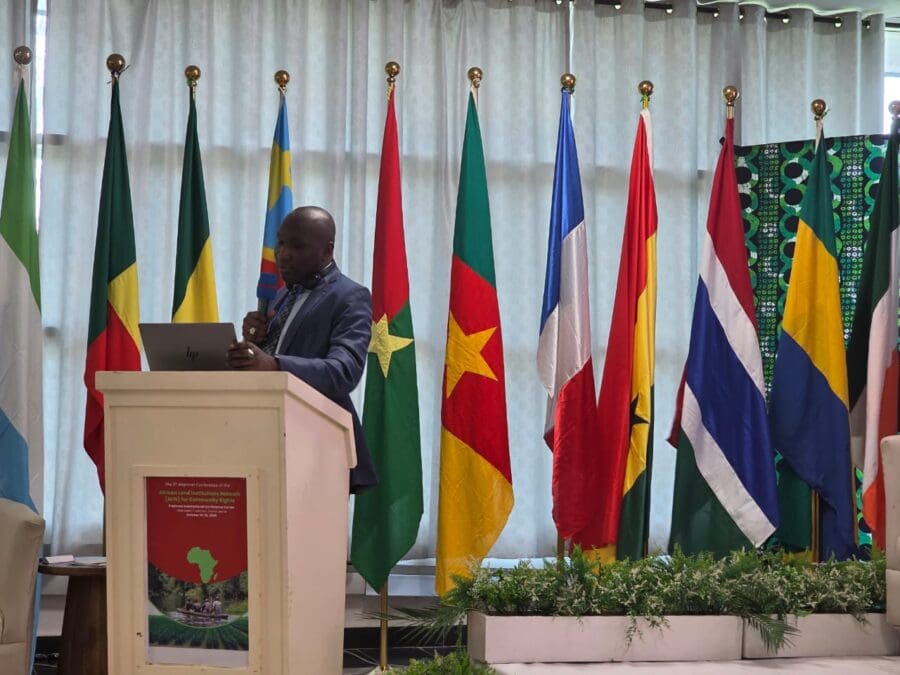
Addressing Challenges and Strengthening Commitments
At the same time, participants identified ongoing challenges, including the lack of harmonized legal frameworks to regulate land tenure and rights, and weak implementation of existing land policies. These challenges continue to affect communities whose collective and customary land rights remain vulnerable.
The discussions concluded with a call to action urging States and partners to strengthen their efforts to ensure that community and customary land rights are guaranteed, protected, and fully integrated into national legislation and policy frameworks.
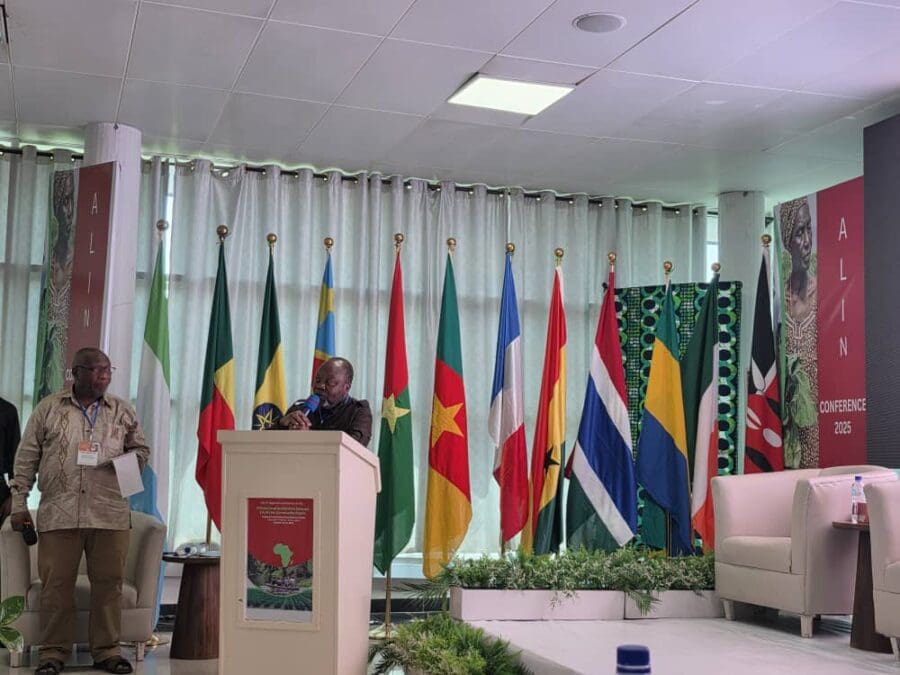
Day 3: Charting the Way Forward: Commitments and Action Plans for Advancing Land Rights in Africa
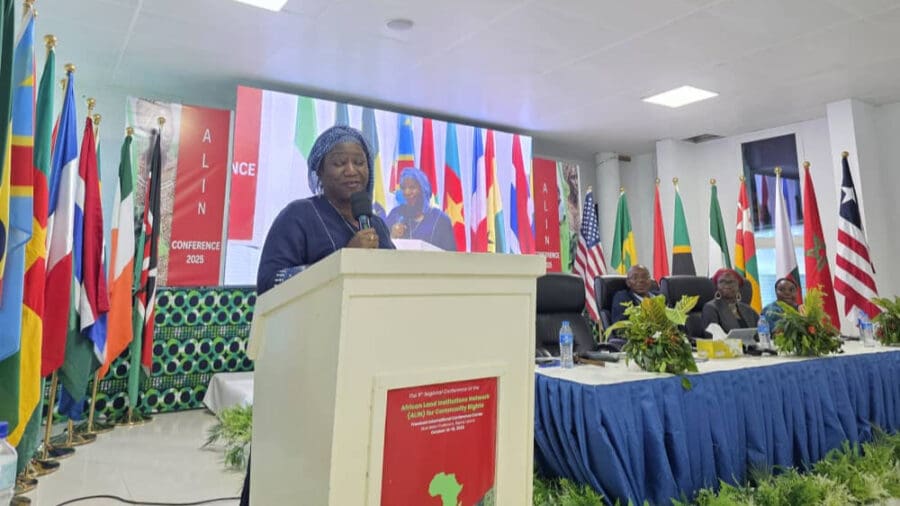
Advancing Collective Action for Land Rights in Africa
The 5th Regional Conference of National Land Institutions (ALIN) brought together governments, partners, and stakeholders from across Africa to assess progress, exchange experiences, and define a joint roadmap for securing community land rights on the continent.
Over three days, participants explored innovative tools and approaches for land governance, reviewed progress made since the 2023 Arusha Conference, and identified persistent challenges such as weak policy implementation and the lack of harmonized legal frameworks. Discussions emphasized the need for inclusive, transparent, and participatory land governance systems that prioritize community and customary land rights.
The Conference concluded with the adoption of 2025–2027 national action plans and a Declaration of commitments to strengthen land legislation and policies, promote women’s leadership, decentralize land administration, and enhance coordination among States and partners. The national action plans were presented by the 16 participating countries: Benin, Burkina Faso, the Democratic Republic of Congo, Gabon, Togo, Senegal, Madagascar, Ethiopia, The Gambia, Ghana, Kenya, Malawi, Morocco, Tanzania, Sierra Leone, and Liberia.
Each country identified its own priorities and defined specific activities to be undertaken over the next two years. Common themes across the plans included the promotion of customary land rights—particularly those of women, and the strengthening of land legislation and policies to ensure land governance systems are more transparent, inclusive, and effectively managed.
Together, these commitments reaffirm Africa’s collective determination to advance secure, equitable, and sustainable land rights for all.
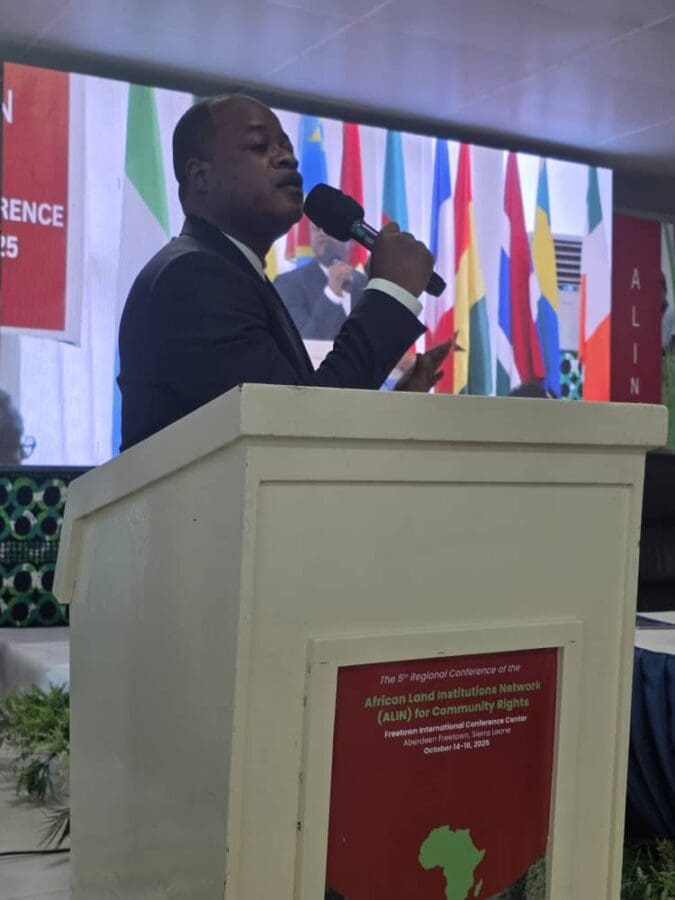
Adoption of the ALIN Declaration and Closing Ceremony
The Conference concluded with the adoption of a Declaration outlining the main commitments by participating States to advance land rights across Africa over the coming years. Key commitments included:
- Promoting women’s leadership and participation in land governance and administration.
- Advancing decentralization to bring governance closer to Indigenous Peoples and local communities.
- Increasing national investments in land reforms and institutional frameworks.
- Strengthening the ALIN network’s governance and country ownership.
- Enhancing regional coordination and policy harmonization, including on pastoralism.
- Engaging traditional leaders and customary institutions as partners in conflict prevention and community-based land governance.
- Aligning civic engagement and community participation with national laws and policies to reinforce accountability and local ownership.
The closing ceremony brought together high-level representatives, including the Minister of Land Rights, Housing, and Country Planning of Sierra Leone, the African Union Representative, the President of RRI, and country delegation leaders. All reaffirmed their commitment to implementing the conference’s resolutions and expressed sincere appreciation to the Government of Sierra Leone for its remarkable leadership and hospitality in hosting this fifth ALIN Conference.
